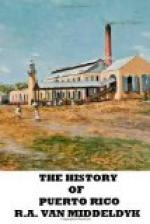“You can not doubt,” they say, “that we endeavor to maintain in this kingdom the Catholic, Apostolic, Roman religion, which you have the happiness to profess; ... the deputies elected by you know, as do the legislators of all times and all nations, that a social edifice not founded on religion, is constructed in vain; ... the true religion which we profess is the greatest blessing which God has bestowed on the Spanish people; we do not recognize as Spaniards those who do not profess it ... It is the surest support of all private and social virtues, of fidelity to the laws and to the monarch, of the love of country and of just liberty, which are graven in every Spanish heart, which have impelled you to battle with the hosts of the usurper, vanquishing and annihilating them, while braving hunger and nakedness, torture, and death.”
The Inquisition is next referred to. It is stated that in their constant endeavor to hasten the termination of the evils that afflict the Spanish nation, the people’s representatives have first given their attention to the Inquisition; that, with the object of discovering the exact civil and ecclesiastical status of the Holy Office, they have examined all the papal bulls and other documents that could throw light on the subject, and have discovered that only the Inquisitor-General had ecclesiastical powers; that the Provincial Inquisitors were merely his delegates acting under his instructions; that no supreme inquisitorial council had ever been instituted by papal brief, and that the general, being with the enemy (the French troops), no Inquisition really existed. From these investigations the Cortes had acquired a knowledge of the mode of procedure of the tribunals, of their history, and of the opinion of them entertained by the Cortes of the kingdom in early days. " ... We will now speak frankly to you,” continues the document, “for it is time that you should know the naked truth, and that the veil be lifted with which false politicians have covered their designs.
“Examining the instructions by which the provincial tribunals were governed, it becomes clear at first sight that the soul of the institution was inviolable secrecy. This covered all the proceedings of the inquisitors, and made them the arbiters of the life and honor of all Spaniards, without responsibility to anybody on earth. They were men, and as such subject to the same errors and passions as the rest of mankind, and it is inconceivable that the nation did not exact responsibility since, in virtue of the temporal power that had been delegated to them, they condemned to seclusion, imprisonment, torture, and death. Thus the inquisitors exercised a power which the Constitution denies to every authority in the land save the sacred person of the king.
“Another notable circumstance made the power of the Inquisitors-General still more unusual; this was that, without consulting the king or the Supreme Pontiff, they dictated laws, changed them, abolished them, or substituted them by others, so that there was within the nation a judge, the Inquisitor-General, whose powers transcended those of the sovereign.




